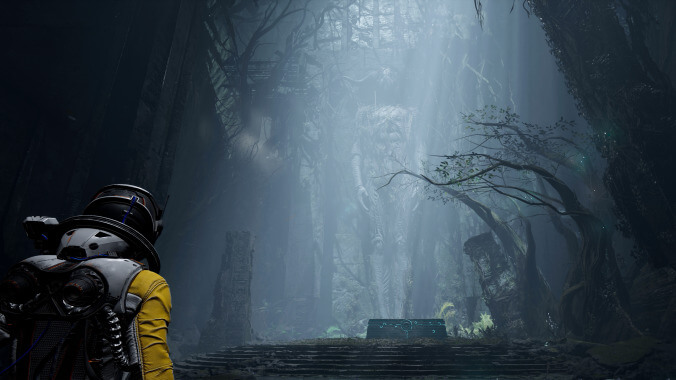since Sony released its big shiny box o’ smoothness, the PlayStation 5: Where are all the PlayStation 5
Don’t get me wrong: I’m generally pretty happy that the vast majority of the titles Sony’s pumped out since the PS5 arrived have been playable on both the new box and the PS4. If your console is a) expensive and b) has spent months being damn near impossible to find, it behooves you to keep your games available on the boxes actually extant in people’s houses. But the utter lack of PS5 exclusives does mean that it’s somehow become the foremost, most cutting-edge video game console on the planet for people who really want to play Astro’s Playroom, Destruction Allstars, and the Demon’s Souls remake, and that’s a pretty weird niche for such a spendy piece of hardware to rest in.
Since the game’s name is, frankly, terrible—dear marketing execs: People don’t want to play games that sound like “urinal” (unless they’re very specifically hunting for games that sound like “urinal”)—it would probably be a good idea to lay out exactly what Returnal’s up to. Players take on the role of Selene, a scout for a space-faring organization who’s found herself abruptly crash-landed on a very weird, very hostile alien planet. Soon after players take control, they’ll start stumbling over evidence that Selene has actually been here before, though—namely, her own corpse, apparently cut down by the planet’s implacably violent fauna at some forgotten point in the past. And that’s about when you start to realize that Sony has finally geared up to throw some serious money at the long-running roguelike genre with one of its first big PS5 exclusive titles.
For the unfamiliar: Roguelikes are generally the least explicitly predatory of the ways games publishers have sought, in recent years, to find the Eternal Game—the holy grail that people will keep on playing, and buying, for years to come, generating endless revenue in its wake. The idea is pretty simple: Toss yourself into a randomized world built from recognizable parts, build up a trove of power-ups, inevitably die, and then restart the game from scratch. Depending on the game, you might unlock some sort of permanent progression through play (Returnal goes the Dead Cells route, allowing you to keep navigation tools and add unlocked items to the pool it draws from when generating random loot). But at its base, your goal with a good roguelike is to get a little further each time, with the most potent resource you’re accruing being your own building familiarity with how the game works.
As far as roguelikes go, Returnal is less random than most—although each level is procedurally generated, it’s more like a rearrangement of set rooms and encounters than any more robust attempt at creating a new world every time you play. But the game absolutely excels in two aspects: Its shooting, and its storytelling. The former is also where Returnal actually tries to earn its weight as a PlayStation 5 exclusive, using the haptic feedback elements in the Dual Sense controller, and the system’s so-far little-used variable pressure triggers, to both inform and alter how you fight. The biggest quirk is the aiming system: Hold the trigger down to its first resistance point (set by information the game is feeding to your controller), and you’ll zoom in, allowing you to target weak points on your various alien opponents. Grip it all the way down, and you instead activate secondary firing, blasting away at enemies with big-damage, long-cooldown hits. Learning the feel for the proper pressure can be awkward—and Sony really needs to offer up the ability to tune this more fully by the player, given different hand sizes, strengths, and capabilities—but with a little bit of practice, it feels organic and smooth. Combine that with shooting gameplay that feels akin to Remedy’s Control, and an adrenaline system that strongly incentivizes building long combos without getting hit, and the battles end up quick-paced, high-tension, and exhilarating.
The story, meanwhile, might benefit even more from the larger group of creators (and funding) Housemarque has brought to bear here. Don’t get me wrong: I love small-team games like The Binding Of Isaac, Enter The Gungeon, etc. But there’s something about seeing this kind of classically indie structure married to a game that can do fully-acted dialogue, beautiful visuals, and full story sequences that’s incredibly refreshing. The veneer of money, corporate expectation, and “polish” that sometimes gets grouped under the name “AAA game development” can be stifling, cowardly, and deceptively cheap. But in Returnal, you feel like every dollar is somewhere on the screen, or in your hands. I’m not far enough into the game to speak to the story in any comprehensive way—I’ve just broken into the second big set of levels, after 10 hours of play——but the notes of existential dread running through its world already linger with me. And Anne Beyer is tremendous as Selene, a spin on Ellen Ripley trapped in a Groundhog Day loop where every single day is the one where her life, and the Xenomorph’s, meet.
Returnal is not a system seller. (Damn thing’s $500, so what could live up to that?) But it is bold, cool, and fearless, full of shocking moments and highly addictive systems. (I haven’t even dipped into the game’s obsessive focus on risk and reward, constantly daring you to take a debilitating weakness in exchange for a much-needed dose of power.) If you already own one of Sony’s big white bookends, though, I’ll be blunt: You probably owe it to yourself to check out the first really great PlayStation 5 game.












![HBO teases new Euphoria, Larry David, and much more in 2026 sizzle reel [Updated]](https://img.pastemagazine.com/wp-content/avuploads/2025/12/12100344/MixCollage-12-Dec-2025-09-56-AM-9137.jpg)




























